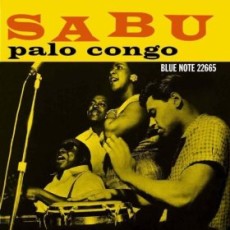
Daily Dose Of Jazz…
Louis “Sabu” Martinez was born on July 14, 1930 in New York City and made his professional debut in 1941 at age 11. He replaced Chano Pozo in Dizzy Gillespie’s orchestra in 1948, and began performing with Benny Goodman’s Bebop Orchestra in 1949.
Over the next 15 years, Martinez worked with jazz luminaries Charlie Parker, Duke Ellington, Count Basie, J.J. Johnson, Mary Lou Williams, Horace Silver, Thelonious Monk, Charles Mingus and Lionel Hampton; vocalist Tony Bennett, Sammy Davis Jr. and Harry Belafonte as well as Latin favorites Noro Morales, Marcelino Guerra, Tito Rodriguez and the Lecuona Cuban Boys.
A prominent conguero and percussionist in the Cubop movement in the 1950s, Martinez appeared on many important recordings and live performances during that period. Martinez also recorded several Latin jazz albums, now recognized as classics of the genre.
Martinez first recorded with Art Blakey in 1953, and contributed to his Orgy in Rhythm and Holiday for Skins projects from 1957–58. Martinez became a bandleader in 1957, recording his debut album, Palo Congo for Blue Note Records. He followed it up with releases on Vik and Alegre Records.
Martinez moved to Sweden in 1967 and recorded with the Francy Boland-Kenny big band, releasing two albums. Subsequently he led the group Burnt Sugar, which was active into the mid ’70s, but, on January 13, 1979, he died in Sweden at the age of 48.
More Posts: conga,percussion
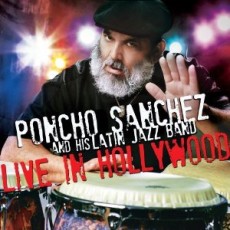
Daily Dose Of Jazz…
Poncho Sanchez was born October 30, 1951 in Laredo, Texas, the youngest of eleven children, but was reared in Norwalk, California. Exposed to and influenced by Afro-Cuban music (mambo, son, cha-cha, rumba, guaracha, salsa) and bebop jazz, he originally started as a guitarist. Discovering his talent for singing during an R&B band audition, he become the group’s lead vocalist. He later taught himself the flute, drums and timbales before finally deciding to pursue conga playing in high school.
In 1975, Sanchez’s idol, vibraphonist Cal Tjader invited him to perform one set with his band. Seeing the young man’s talent, Tjader hired Sanchez for a week before officially making him a full member of the ensemble. Sanchez played a crucial role as conguero for several years until Tjader’s death in 1982.
Before his death, Tjader suggested to Carl Jefferson, Concord Records founder, to sign Sanchez and his soon-to-be-formed group under the Concord Picante label. Tjader’s wishes were honored, and the first two records were composed and arranged by long-time Tjader collaborator Clare Fischer. Poncho produced 19 albums for the label and garnered a Grammy for his “Latin Soul” album.
He has played with Mongo Santamaria, Hugh Masekela and a host of jazz and Latin musicians and vocalists to numerous to name along with the iconic funk band Tower of Power on his “Do It” project. Poncho Sanchez is respected as one of the top percussionists of our time and continues to perform worldwide.
More Posts: conga,percussion
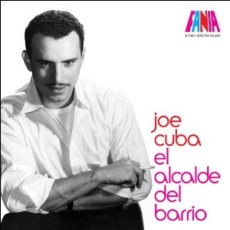
Daily Dose Of Jazz…
Joe Cuba was born Gilberto Miguel Calderon to Puerto Rican parents on April 22, 1931 in Spanish Harlem in New York City. Playing in his father’s organized stickball club “the Devils”, Cuba broke his leg and his attention shifted to the conga. Practicing every free moment between school, after graduating from high school he joined a band.
In 1950, when he was 19 years old, he played for J. Panama and also for a group called La Alfarona X. The group soon disbanding, Cuba enrolled in college to study law. While at college he attended a concert in which Tito Puente performed. He went up to Tito and introduced himself as a student and fan and soon they developed what was to become a lifetime friendship. This event motivated Cuba to organize his own band and in 1954, his agent recommended that he change the band’s name from the Jose Calderon Sextet to the Joe Cuba Sextet, making their debut at the Stardust Ballroom.
In 1962, Cuba recorded “To Be With You” with the vocals of Cheo Feliciano and Jimmy Sabater, Sr. The band became popular in the New York Latin community. The lyrics to Cuba’s music used a mixture of Spanish and English, becoming an important part of the Nuyorican Movement.
In 1965, the Sextet got their first crossover hit with the Latin and soul fusion of “El Pito” (I Never Go Back To Georgia) a chant taken from Dizzy Gillespie’s intro to the seminal Afro-Cuban tune, “Manteca”. Sabater later revealed, “None of them had ever been to Georgia.
Along with fellow Nuyorican artists such as Ray Barretto and Richie Ray, Cuba was at the forefront of the developing Latin soul sound in New York, merging American R&B styles with Afro-Cuban instrumentation. Cuba was one of the key architects behind the emerging Latin Boogaloo sound, which became a popular and influential Latin style in the latter half of the 1960s.
By 1966, his band which included timbales, congas, bongos, bass, vibraphones and piano among its musical instruments scored a U.S. “hit” on the National Hit Parade List with the song “Bang Bang”, kicking off the popularity of the boogaloo. He also had a Billboard #1 hit that same year with “Sock It To Me Baby” .
Inducted into the International Latin Music Hall of Fame in 1999, Joe was named Grand Marshall of the Puerto Rican Day Parade celebrated in Yonkers, New York in 2004; and was also the director of the Museum of La Salsa, located in Spanish Harlem, Manhattan, New York.
Joe Cuba, conga player and Father of Latin Boogaloo was hospitalized for a persistent bacterial infection and passed away on February 15, 2009 in New York City, after being removed from life support.
More Posts: conga
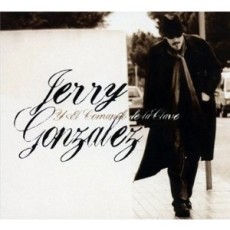
Daily Dose Of Jazz…
Jerry Gonzalez was born in the Bronx, New York City on June 5, 1949. Of Latin heritage, he grew up with jazz and Afro-Cuban music that left a deep impact on his musical appreciation. Listening to his father’s jazz collection he was influenced by Miles Davis, Dizzy Gillespie and Louis Armstrong along with gleaning inspiration from Tito Puente, Eddie Palmieri and Mongo Santamaria.
Studying music in junior high school, Gonzalez took up the trumpet and later the congas, continuing he formal training at New York College of Music and New York University. He began his professional career in 1963 playing with Lewellyn Mathews in New York State World’s Fair. In 1970 playing with Dizzy Gillespie, under whose tutelage he fused African based rhythms onto jazz elements seamlessly without detracting from either.
After playing with Manny Oquendo and Eddie Palmieri, Jerry created the Fort Apache Band with Andy Gonzalez (his brother), Larry Willis and Steve Berrios. A later reconfiguration and naming, Jerry Gonzalez & the Fort Apache Band became much more successful performing at European jazz festivals and subsequent recordings. Three albums later, “Rumba Para Monk” released in 1989, topped a readers’ poll in Down Beat magazine and was named the “Jazz Album Of The Year” in France by the Academie du Jazz. In 1998 they won both the industry and journalist polls in the New York Jazz Awards Latin Jazz category.
Gonzalez has played and/or collaborated with Tito Puente, McCoy Tyner, Jaco Pastorious, Chet Baker, Woody Shaw, Tony Williams, Larry Young, Freddie Hubbard, Chico O’Farill, Papo Vasquez, Ray Barretto, The Beach Boys, Chico Freeman and Paquito D’Rivera among others but his most noteworthy contribution is to Afro-Cuban jazz and a resurgence in Latin jazz in the 80s and 90s. With seventeen albums as a leader under his belt and a host of recording sessions as a sideman, since 2000, trumpeter Jerry Gonzalez has lived and played in and around jazz clubs in Madrid.
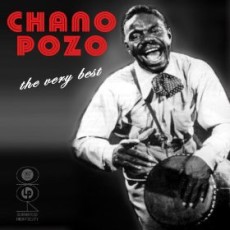
Daily Dose Of Jazz…
Chano Pozo was born Luciano Pozo Gonales was born in Havana, Cuba on January 7, 1915 and Chano showed an early interest in drumming, gaining his musical background performing ably in Afro-Cuban religious ceremonies in which drumming was a key element.
Growing up in poverty in the foul and dangerous area of El Africa solar where even the police feared to tread, By 13 he was in reformatory learning to read and write, study auto repair and hone his already exceptional drumming skill. Upon his release and during a series of lackluster jobs he composed music. His reputation grew among the people each year for the compositions he wrote for carnival and he quickly became the most sought after rumbero in Cuba.
At the beginning of 1947 Pozo moved to New York City with the encouragement of Miguelito Valdes with who he recorded along with Arsenio Rodriguez, Carlos Vidal Bolado and Jose Mangual. By September he was a featured performer with Dizzy Gillespie’s Big Band at Carnegie Hall and subsequently on a European tour. Their most notable material was ‘Cubana Be, Cubana Bop, Tin Tin Deo and Manteca, the latter two co-written by Pozo.
A conguero, percussionist, singer, dancer and composer, Chano became one of the founding fathers of Latin jazz, which was essentially a blend of bebop and Cuban folk music. Chano Pozo, a hot-tempered Cuban, was killed in a Harlem bar, a little more than a month shy of his 34th birthday on December 2, 1948.
Chano Pozo: 1915-1948 / Drums, Percussion
More Posts: conga,percussion,vocal



